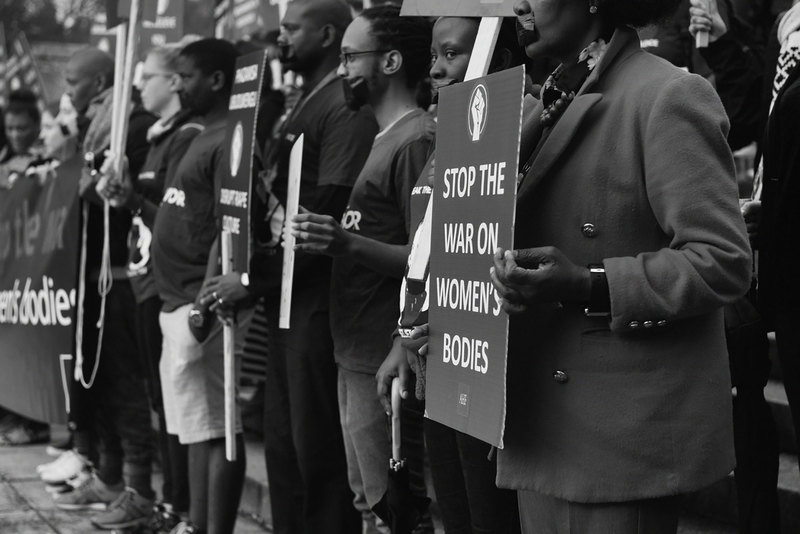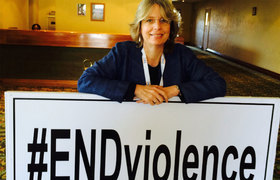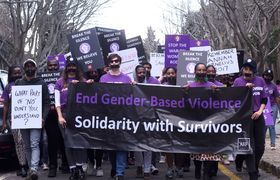Help at hand: Alumni campaign launched to support GBV survivors
29 July 2021 | Story Helen Swingler. Photo Robyn Walker. Read time 5 min.
The University of Cape Town (UCT) has called on its alumni around the world to support the Alumni in Action programme. This new initiative provides psychological assistance to UCT survivors of gender‑based violence (GBV). Contributions to the programme can be in the form of funds or assistance with psychological and counselling services.
Nationally, incidents of GBV have escalated during the pandemic, affecting students and staff. Funds donated to the initiative will amplify students’ access to mental health services.
Existing support for survivors is based within UCT’s Office for Inclusivity & Change (OIC) and Student Wellness Service (SWS). The Alumni in Action campaign, centrally led by the OIC, is the brainchild of alumnus Zellah Fuphe and a current UCT student, Sanda Nyoka. Fuphe and Nyoka are in partnership with the OIC, the Development and Alumni Department (DAD) and SWS. It has also received a strong endorsement from the Students’ Representative Council.
On 19 July DAD launched a fundraising drive to support this campaign. Fuphe kick‑started the drive by donating R120 000 of her own funds for the first phase of the roll‑out. The project has received an additional R100 000 donation from the Mauerberger Foundation Fund, chaired by alumnus Dianna Yach. Yach is also chairperson of the UCT Alumni Advisory Board (AAB), which has been advocating for alumni to become more engaged with their alma mater especially by sharing their skills and passion in giving back to society with kindness and compassion.
“The AAB wants to encourage more alumni to show ‘leadership in action’ by participating in programmes devoted to the well-being of our students and staff, and particularly survivors of GBV,” said Yach. “We want to ensure that no one has to suffer in silence [but instead] feel able to reach out and receive appropriate care and support.
“Zellah has demonstrated exemplary leadership in working with the Student Wellness Service and the OIC. We look forward to more alumni coming forward to join this programme in action.”
Funds and skills needed
In addition to funding, DAD is also calling on alumni who are registered psychologists to come on board by supplementing UCT’s existing mental health support services. The call is targeted at South African‑based alumni who are current or retired registered counselling practitioners and have the qualifications, skills and time to conduct face‑to‑face and/or online sessions with survivors.
Director of the OIC Dr Sianne Alves said the 2018 Global Peace Index revealed that South Africa is one of the most violent places in the world, ranked 38 out of 163 countries.
“All of us living in South Africa are inundated by reports of the horrific and senseless murder, rape and maiming of women, children, queer folk and, in some instances, men. Survivors require dedicated resources over a long period of time to help them rebuild their own agency and resilience after trauma.
“The psychological impact of gender‑based violence on some survivors can affect their academic performance and the quality of their social interactions. This why this Alumni in Action programme is a necessary initiative [that deserves] support,” said Dr Alves.
The initiative also benefits from Vice-‑Chancellor Professor Mamokgethi Phakeng’s enthusiastic support.
“For too long, gender‑based violence has been allowed to run rampant, cutting victims down physically and psychologically so that they never reach their potential.”
“As we look ahead to Women’s Month in August, we will be celebrating the many successes achieved by womxn within our UCT community: students, academic staff, and professional and administrative support and service staff. But we must not forget about the barriers that remain in our hyper-violent society, making womxn second-class citizens. Gender-based violence is at the top.
“For too long, sexual and gender-based violence has been allowed to run rampant, cutting victims down physically and psychologically so that they never reach their potential. It’s a huge indictment on our society – and a massive loss. I see this campaign as part of our commitment to creating a community of care. With the proper care and resources, we can help survivors rebuild their lives,” said Professor Phakeng.
The vice-chancellor urged UCT alumni to get behind the campaign: “If you don’t have funds to donate, but can share professional skills, we’d love to have you on board. It’s a beautiful way to give back to your alma mater and be part of reshaping our society.”
How to get involved
There are two ways alumni can support the campaign:
- Provide eight consecutive counselling sessions, at a discounted rate. To register, please click here.
- Pledge financial support: If you aren’t able to assist with counselling but would like to contribute financially to sponsor sessions for survivors, please donate here. Donations big or small will ensure the long‑term sustainability of the programme.
“This is an opportunity for alumni to make a difference where it matters the most,” said acting executive director of DAD, Sidney van Heerden. “UCT alumni can take the lead in putting thought into action by standing up against gender‑based violence. As an alumni community working together, we can change the course of a young person’s life.”
 This work is licensed under a Creative Commons Attribution-NoDerivatives 4.0 International License.
This work is licensed under a Creative Commons Attribution-NoDerivatives 4.0 International License.
Please view the republishing articles page for more information.










